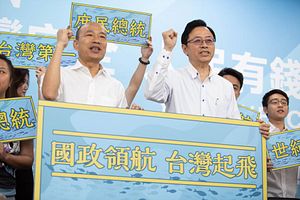Kuomintang (KMT) presidential candidate Han Kuo-yu announced on Monday that former premier Chang San-cheng would be his running mate, kicking off a week marked by a property acquisition scandal and controversial remarks by Han and his wife.
The Kaohsiung mayor surged to a lead in Taiwan’s presidential race earlier this year but has plummeted in the polls since this summer, dramatically draining the momentum of the populist phenomenon Taiwanese media had dubbed the “Han wave.”
Chang, who briefly served as former President Ma Ying-jeou’s premier during his last months in office, could bring stability to the ticket but is unlikely to move the needle as Han struggles with declining poll numbers and lackluster support from major KMT figures, many of whom may have been reluctant to serve as Han’s running mate.
Chang, a tech expert who was once a Google executive, had served as Han’s national policy expert during his campaign.
“I am not green or blue,” he said after accepting Han’s invitation, referring to the colors of the ruling Democratic Progressive Party (DPP) and the KMT, respectively. “My heart only has right and wrong, without any colors.”
Names of more prominent KMT figures, such as 2016 presidential candidate Eric Chu, were floated prior to Han’s announcement, but analysts believe Han could have struggled to convince a bigger name to join the ticket, according to the South China Morning Post.
Han and his campaign team likely did not expect to be in this position. In May, Han boasted a lead over President Tsai Ing-wen, whose approval ratings continued to suffer due to what voters saw as domestic policy failures and an inability to jumpstart Taiwan’s economy.
But Tsai began to regain momentum after speaking in support of Hong Kong protesters in June, while Han’s eccentric public behavior, his performance as mayor of Kaohsiung, and his lack of specific, coherent policies contributed to his rapid fall in the polls. As of Monday, Han trailed Tsai by 13 percentage points, according to a poll tracker published by Taipei-based The News Lens.
This week, Han has made the sort of headlines a presidential candidate two months away from elections would like to avoid. The Chinese-language Next Magazine discovered that Han and his wife, Lee Chia-fen, own several properties throughout the country and alleged that Kao Mei-lan, the secretary-general of Kaohsiung’s tourism bureau, was involved in acquiring them.
DPP legislator Liu Shyh-fang called for an investigation into the transactions on Wednesday and said the acquisitions sully Han’s image as a “everyman,” accusing Han of “flipping properties while pretending to be an ‘everyday person’ to win votes,” according to the Taipei Times.
On Monday, DPP legislator Lin Chun-hsien accused Han of pressuring a construction company to offer a loan for a luxury apartment, saying his wife arranged three meetings between a city councilor and the company after it initially refused to grant the loan.
Lee, Han’s wife, who has appeared alongside and in place of Han at campaign rallies, sparked outrage on Monday when she claimed to have evidence that elementary school students in Taiwanese schools are being taught about “anal sex” and “orgasms.” Her claims allegedly stemmed from a video in which a third-grade teacher instructs students on the general function of condoms after having received permission from parents.
Taiwan’s premier, Su Tseng-chang, called Lee’s allegations “a malicious smear” and said “she irresponsibly spreads rumors again and again, which is very inappropriate.” The country’s Ministry of Education also said in a Facebook post that the allegations are “malicious fake reports” that are “deliberately causing social panic.”
Gender equality education remains a hot-button issue among socially conservative voters in Taiwan, which became the first country in Asia to legalize same-sex marriage in May. In November, voters approved a referendum measure that would restrict mandatory gender equality education in public schools, part of a slate of successful referendums proposed by groups opposing same-sex marriage.
Han and the KMT have mostly stayed silent on LGBT equality issues after opposing the May law passed to legalize same-sex marriage, but Lee’s recent statements could be an attempt to galvanize older, more conservative voters within the KMT’s base.
Han on Sunday colorfully described the perceived threat to his candidacy, saying an unidentified “Big Brother” was prepared to drop “five nuclear bombs” to “blast him to death.” Han will now be hoping his choice of Chang is the first step toward bringing his faltering campaign back to life.

































